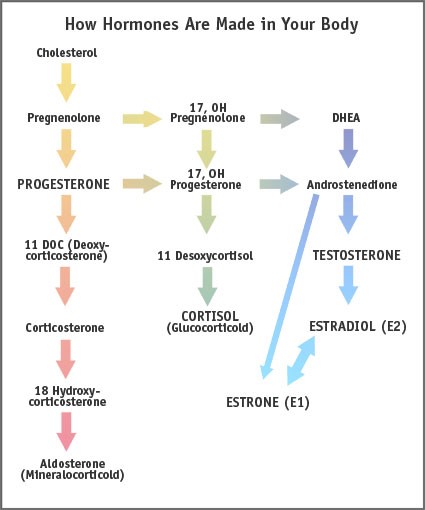We have discussed so far about how the body handles stress and the strong connection between stress, adrenal hormones (epinephrine and norepinephrine, and cortisol) and insulin interaction as we manage stress. Today, I am going a step further as we look at adrenal hormones interactions with DHEA and our sex hormones.
Dehydioepiandrosterone, in short DHEA, is connected with the adrenal hormones in more ways than one. First, DHEA is a natural form of steroid produced in the adrenal gland itself (as well as in gonads, ovaries and brain). Secondly, cortisol and all male and female hormones are related to DHEA and cholesterol as shown in the following metabolic pathway chart.
The simplest way to understand the above chart is to start looking at the outcome (bottom item) of the 3 columns presented. The left-hand column ultimately regulates our body’s salt content (mineralocorticoid), the center column regulates sugar (glucocorticoid) and the right hand column manages our sex functions (androgen and estrogens). As one can see, these 3 major areas of our bodily function are closely related and highly interdependent on one another and to our adrenal gland.
A case in point, adrenal fatigue can affect the amount of DHEA secreted in the adrenals, reducing the body’s ability to metabolize sex hormones and produce normal sex hormone levels. Conversely, reduced progesterone production in the ovaries can diminish the amount of cortisol and adrenaline manufactured in the adrenal glands. As shown below, the male testosterone has a inverse relationship with stress hormone cortisol.
 Is it still surprising to you that we may experience a wide-range of possible ill-effects related to stress? For example, diabetes (sugar), hypoglycemia (sugar), hyperglycemia (sugar), kidney dis-functions (salt/mineral process), heart diseases (salt/mineral imbalance), joint inflammation and muscle atrophy (cortisol triggered gluconeogenesis effect), brain and mental illnesses (neurotransmitter deficiencies), male and female reproductive functions (controlled by several hormones produced at the adrenal glands), and many other areas are all inter-related to one another in our body’s complex metabolism system.
Is it still surprising to you that we may experience a wide-range of possible ill-effects related to stress? For example, diabetes (sugar), hypoglycemia (sugar), hyperglycemia (sugar), kidney dis-functions (salt/mineral process), heart diseases (salt/mineral imbalance), joint inflammation and muscle atrophy (cortisol triggered gluconeogenesis effect), brain and mental illnesses (neurotransmitter deficiencies), male and female reproductive functions (controlled by several hormones produced at the adrenal glands), and many other areas are all inter-related to one another in our body’s complex metabolism system.
Don’t get me wrong, I am certainly not saying that these serious health concerns are all and only caused by stress. That would be wrong! Quite contrary, each and every one of these health challenges may very well have their own dominant factors that have not been described here. However, what I am saying is that the stress factor should not be easily set aside. You and I should examine our bio-physical and non-bio-physical aspects of who we are into account as we endeavor on this holistic wellness journey of our lives. Stress is one of those we should not ignore!
As described in our earlier blogs on this subject, high level of cortisol production is secreted from the adrenal glands into our blood stream to prepare our body for an on-going stressful event. This triggers a myriad of sequences of action to better prepare us for the fight or flee emergency mode. When the crisis is over, by means of para-sympathetic autonomic nervous system’s actions, it returns our body back to the normal restful and relaxed mode of operation. However, in modern day living, we experience too frequently low- to mid-level of stress in a on-going basis, our adrenal gland never quite reaches a “fully restful” state. As a result, these glands can be easily exhausted. When that happens, the adrenal glands can no longer sustain the appropriate response required for a given stress. The adrenal fatigue sets in and all of the hormone levels become sub-optimal at best.
Some of the symptoms of adrenal fatigue may include pronounced and constant fatigueness, flagging motivation, depressed mood, change in appetite, and overall weakness.
From the charts shown here, the natural progesterone and pregnenolone may be explored as one of the methods of helping your body to balancing the cortisol and sex hormones. In short, natural and bio-identical progesterone, for example, may indirectly aid in regulating our body’s salt, sugar, and both male and female sex functions.
I am not going to make this any more complicated than it can be. I believe we have established a high level understanding about the connection between stress, adrenaline, cortisol, insulin, and hormones. If one suffers any of the symptoms related to any of the above areas, it would be prudent to visit a medical professional who is anand ask for evaluation in all of these inter-dependent area for a better understanding of the root cause and hopefully help us to find appropriate holistic solutions.
Speaking of solutions, that’s what we are going to dedicate the next few blogs on. Stay tuned….
Resources:
“The Miracle of Bio-Identical Hormones,” by Michael E. Platt, M.D.
“Beyond Fight or Flight,” by Robert M. Sargis, MD, PhD
http://www.hormone.org/hormones-and-health/what-do-hormones-do/cortisol
“Adrenaline Dominance – A Revolutional Approach to Wellness,” by Michael E. Platt, MD


Leave a Reply